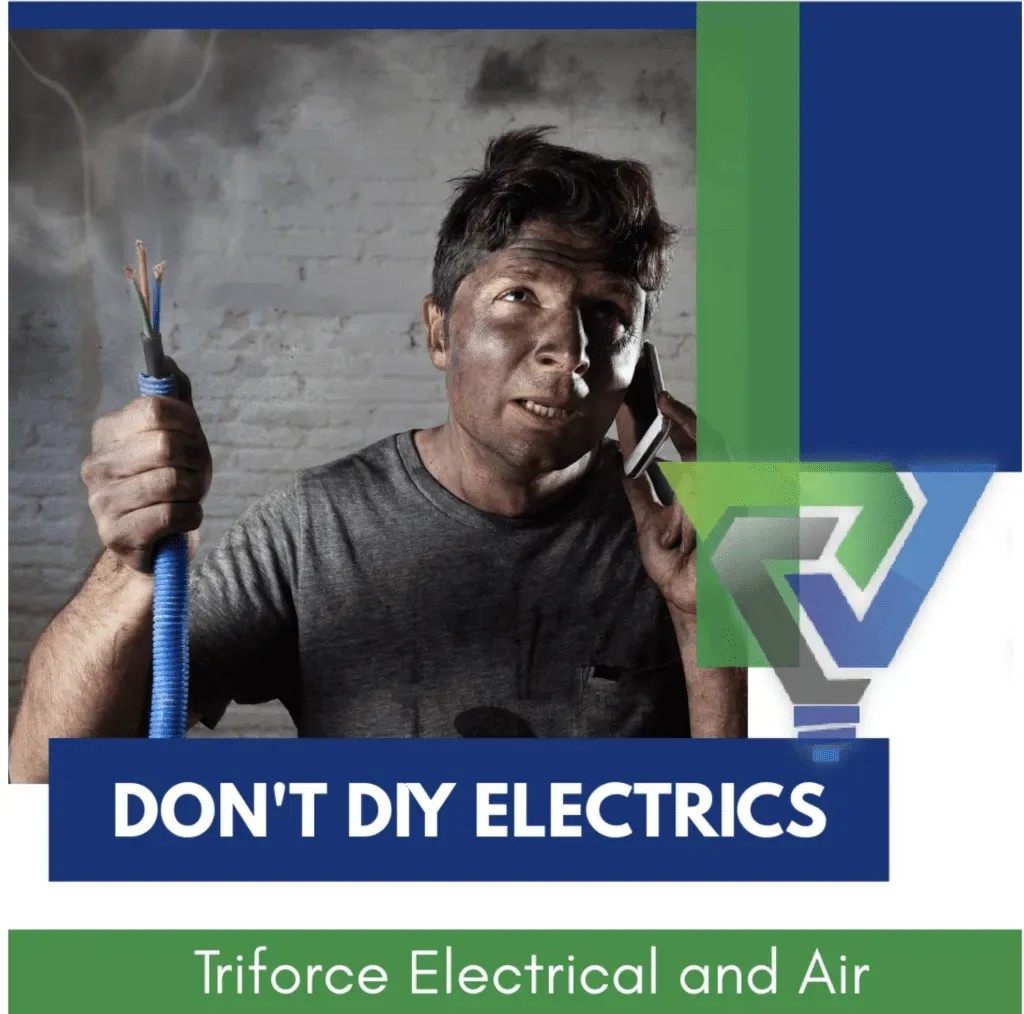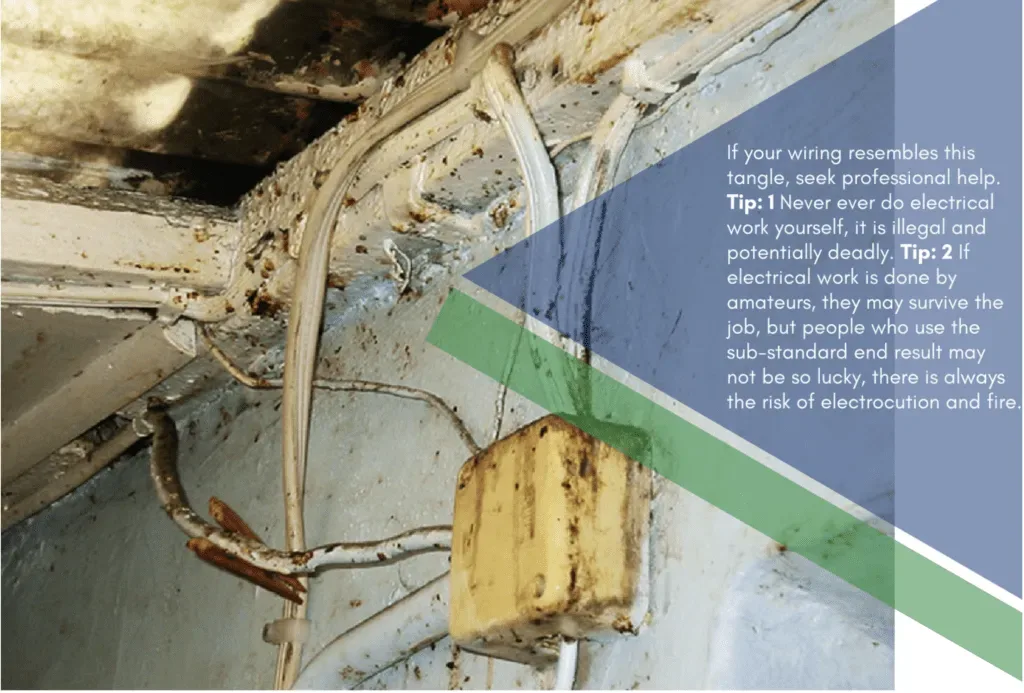Electrical Safety: DIY = DIE

Electrical Safety – Everything Homeowners, Landlords and Tenants need to know:
All Brisbane property owners and managers have a duty of care under electrical safety laws to ensure that their rental property is electrically safe for all tenants and people that may visit or work on the premises.
Over the course of our Electrical Safety Series we will discuss the 10 main areas of electrical safety and maintenance that the homeowner, landlord and tenant needs to be aware of.
1. Safety Switches
2. Smoke Alarms
3. DIY
4. Roof Spaces
5. Faults, Tingles and Shocks
6. Overhead Powerlines and Service Lines
7. Private Power Pole Maintenance
8. Dial before you Dig
9. Maintaining Electrical Equipment
10. Solar Systems
Did you know that over 500 people are hospitalised each year from completing their own DIY electrical work? and that males are 4 times more likely to be injured in a DIY electrical project? It can be tempting to save some money, jump on YouTube and give it a crack “blue wire here, green there, snap this back on and done” – it’s seems simple right but it’s actually extremely dangerous, against the law, may lead to heavy fines and loss of life.
Major property damage from an electrical fault as a result of DIY jobs also means ZERO insurance coverage. Even qualified, experienced electricians have nasty accidents, amateurs can’t begin to understand the complexities of household electrical systems – yet it’s still happening.

But what if I do the work and then get the professionals to come and check it?
Licenced electrical workers are required by law to ensure electrical work is performed in accordance with legislative requirements and any applicable code of practice and technical standards. It is against electrical safety regulations to retrospectively certify any DIY work – even if it is 100% compliant as it was performed illegally. Furthermore, there is no guarantee that DIY work won’t lead to a dangerous fault in the long term and cannot be covered by liability insurance.
What if the Landlord or Tenant is a Qualified Electrician?
If the tenant or landlord is a licensed electrician, they are permitted to fix “plug-in” items such as a fridge ONLY. It still remains illegal to fix any other part of the property or its hardwired equipment.
Businesses which provide electrical work services for others in Queensland must have an electrical contractor licence. The actual electrical work may be done by one of the contractor’s licensed electrical workers. It is possible for the business you work for to undertake the job and allow you to perform it, however they must be certified as appropriate by the real estate agent. Failure to comply with these legal standards may void your insurance policies and result in heavy fines.
The reasoning for this is that licensed electrical contractors are required to meet specific insurance requirements including having a minimum of $5 million public liability insurance, with a $50,000 consumer protection component. A person who does not hold a contractor licence or not working under a company that is willing to sign off on the job does not provide this assurance or protection to future tenants.
What are the acceptable tasks tenants/landlords/ homeowners can do?
· Replacing a drive belt in a washing machine.
· Cutting openings for, but not connecting, air-conditioning units.
· Fitting, but not connecting, an electric wall oven in a kitchen cabinet.
· Install garden lighting and pond pumps.
· Install battery-operated smoke detectors.
· Changing a light bulb or fluorescent tube.
· Resetting a circuit breaker or safety switch.
· Turning the main switch on or off.
What am I forbidden to do?
Under section 18 of the Electrical Safety Act 2002 (the Act), electrical work includes “the manufacturing, constructing, installing, testing, maintaining, repairing, altering, removing, or replacing of electrical equipment”.
This covers tasks like:
· installing a new power point
· replacing a light switch
· replacing a batten holder with a new light fitting
· repairing an electrical appliance like a heater
· altering the location of an existing powerpoint
· replacing a light fitting with a ceiling fan
· constructing an extension lead
· replacing a plug on the end of an extension lead.
The above is some “usual” things people may try to DIY. If its electrical don’t DIY it.
What are the Penalties?
All DIY electrical work is regarded as illegal (Electrical Safety Act 2002; Electrical Safety Regulation 2013 QLD) and comes with penalties up to $40,000 for individuals. A breach that exposes another person to a risk, death, serious injury or illness may attract penalties up to $600,000 for an individual and/or up to 5 years in prison.
How do I choose an appropriate electrical contractor?
If you are the tenant of the property you have the responsibility to report faults to the real estate agent straight away, so an appropriate electrical contractor can be sourced.
When you are choosing an electrician, you must ensure that they have a current contractor’s licence. You can check this by visiting electricalsafety.qld.gov.au. They will be able to issue you with a certificate of compliance ensuring legal “rules” have been met.
For faults in relation to plug in appliances, you should contact the authorised service agent (such as a white-good technician) or a licensed electrical contractor that has the skill set to repair it.
In every instance, a certified and professional electrician should be sought to complete all electrical services work. It is simply too dangerous not to use a skilled and qualified electrician. Here at Triforce Electrical PTY LTD we are a fully licenced and insured business that prides itself on customer safety. We won’t let you down!